HUNTING, MODERNITY, AND THE CRISIS OF THE WILD ***sold***
CHARLES STÉPANOFF
(La découverte, 400 pages, 2021)
The anthropologist Charles Stépanoff’s first major work was devoted to Siberian indigenous communities and their shamanistic practices. With the same ethnographic sensibility, he now turns his attention to the hunters and country folks of his native land, in the woodlands and forests of rural France, and takes up hunting as a field of inquiry to investigate the West’s relationship to the wild. Embracing a large-scale comparative approach, he brings together prehistory, history, philosophy, and ethnology to shed new light on the anthropological and historical foundations of the violence that human societies have exerted, and continue to exert, on the living world. By questioning the exploitation/protection paradigm that defines our modern ethical attitude towards nonhuman others, Stépanoff deepens our understanding of our most pressing environmental concerns.
Stépanoff first takes us on a journey into rural France, where we meet local people who hunt to bring food to their tables, and urbanites for whom hunting is a sport; forest rangers and animal rights activists; as well as gray partridges and swallows, wild boars and bucks, hares and dogs. We discover the persistence of traditional legends, myths, and ancient hunting rituals. Listening to local people deplore the increasing silence of a countryside deprived of bird song, we understand, in a manner much more eloquent than any statistics, what it means to live in a world that “is becoming empty.”
In the second part of the book, Stépanoff delves into the distant past to retrace the role of hunting in the process of hominization and the development of the human brain, revisiting the Neolithic Revolution, about which it is often said that relations between humans and the wild began to break down. From the Sumerians to the kings of France, he shows how hunting played a fundamental role in the exercise of sovereign power, as an expression of the royal monopoly on violence.
Finally, Stépanoff retraces the philosophical and literary underpinnings of Western attitudes toward the animal kingdom that still find expression today in the ongoing conflict between the exploitation and the protection of nature. In this ambitious anthropological and historical tour de force, Stépanoff brilliantly embodies Lévi-Strauss’ method and approach to the everyday: “The faraway illuminates the near, but the near can also illuminate the faraway.”
Charles Stépanoff is an anthropologist, director of studies at the Ecole des Hautes Etudes en Sciences Sociales, and member of the Social Anthropology Laboratory of the Collège de France. He has published, among other works, Traveling into the Invisible: Shamanic Imagination in the Far North (La Découverte, 2019).

